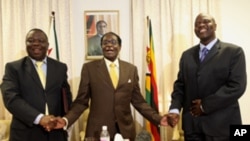Zimbabwe embarked on a massive immunization campaign against measles and polio on Monday, targeting about two million children under the age of five.
Statistics show that at least 100 children die of largely preventable diseases in the country everyday, and officials say the weeklong vaccination program is meant to roll back the worrying mortality rate.
Health and Child Welfare Minister, Henry Madzorera launched the program in Harare, administering vaccines to a number of children and doses of Vitamin A supplements.
He urged parents across the country to have their children vaccinated at designated points, including those from apostolic sects that normally shun conventional health care.
"Diseases do not select on the basis of religious affiliation, and it is the duty of every adult to ensure that no child dies of a preventable disease," state radio quoted Madzorera as saying.
The government is carrying out the immunization outreach with the help of the United Nations Children's Fund, UNICEF, which normally handles funds donated by different agencies and countries to help revitalize Zimbabwe's health sector.
The campaign is funded by Japan. UNICEF representative in Harare, Peter Salama said he was hopeful all children needing immunization would get it.
"In partnership with the international donor community, the rate of children immunized will continue to rise," Salama told VOA.
"Through the support of Japan and the ministry of health, UNICEF has managed to provide all the measles and polio vaccines and injection, and safety materials."
The program is also supported by the Measles-Rubella Iniative, American Red Cross, U.S. Center for Disease Control, among others.
Zimbabwe's economic decline over the years has had a devastating effect on the health sector, resulting in the acute shortage of medication, including Aids drugs.
It has also seen the death of hundreds of people of curable diseases such as the cholera outbreak that claimed more than four thousand lives in 2008.
But experts say the improvement in the country's economic conditions since the adoption of a multi-currency system that includes the U.S. Dollar and the South African Rand in 2009, has slightly infused life into the struggling health sector.




